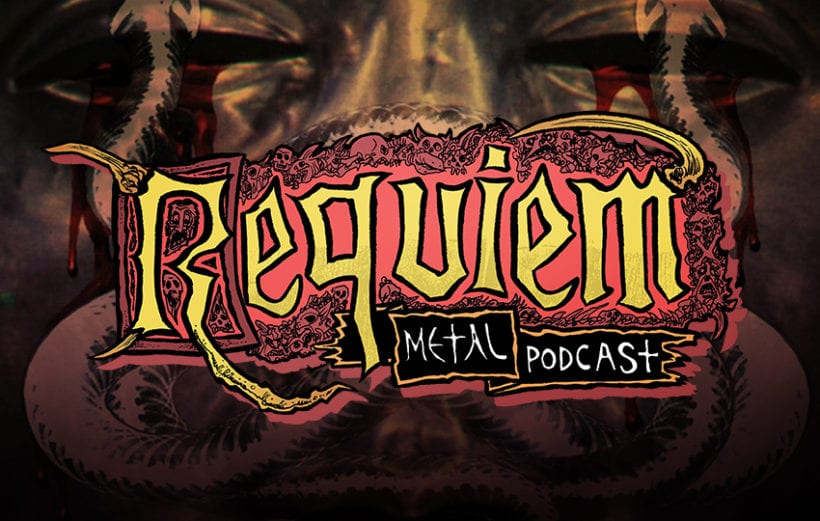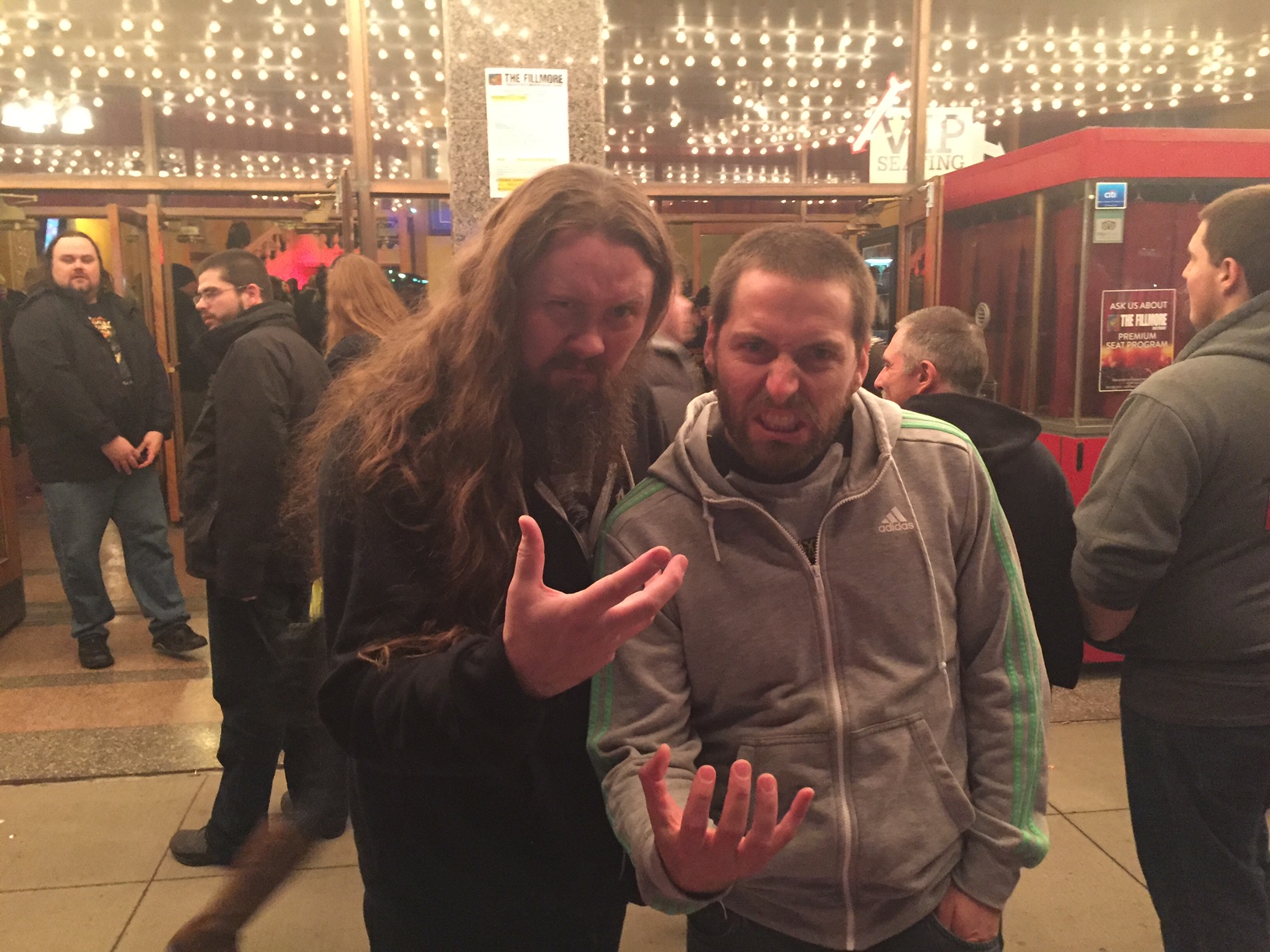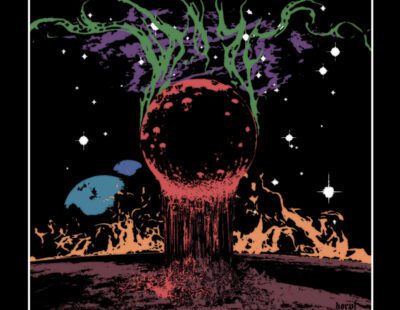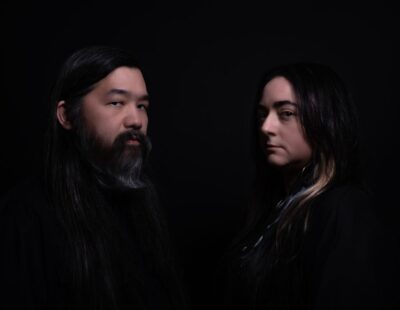
Here’s the best possible compliment we can pay Requiem Metal Podcast: Each episode is arguably the best thing they’ve ever done. There are episodes where hosts Jason Hundey and Mark Rudolph are fully on board with the topic from the jump, and episodes where one takes the opportunity to plead with and try to convert the other to the cause. Each episode is a journey, well-organized and informative—owing both to Hundey’s background as a teacher and Rudolph’s acumen as a designer (and longtime Decibel illustrator)—and radiating with the kind of warmth that can only come from two friends who’ve known each other forever.
Requiem pulls out all of the stops with its four-part series on the 25th anniversary of Neurosis’ Through Silver in Blood, a landmark album in extreme music. This impossibly-overstuffed episode features interview segments with Steve Von Till and Noah Landis of Neurosis, testimonials from musicians and admirers (including Decibel’s Albert Mudrian and Daniel Lake), detailed commentary on the album and its myriad influences, and, of course, numerous references to random people from Michigan that most of us probably don’t know. Decibel checked in with Jason and Mark to chat about all things Neurosis and why this episode might be a true game-changer for Requiem Metal Podcast.
At current writing, you’ve uploaded the first two (of four) parts of the deep-dive on Through Silver in Blood. Spoiler alert: five hours in, you still haven’t started dissecting the album itself. That’s a lot of context even for Requiem. Why do you think it’s important to lay this much groundwork for a band like Neurosis?
Jason Hundey: I’ll take the blame for that—I famously get a little overboard and take a simple idea and complicate it. I think what was important for us was to do something different for an album of this magnitude. We didn’t want to just recycle past interviews, write-ups or the Decibel Hall of Fame feature on it. The challenge with some of these legendary records is that so much has already been dissected and there is limited podcast bandwidth and attention-span—it’s why we haven’t done traditional episodes on some of the most common or mainstream bands in metal. For us, the question is always: What’s the unique angle? We’ve done a couple of other episodes on other Neurosis records, and thought it’d be cool to do some more historical context with this episode- it was almost a challenge.
Mark Rudolph: That might seem like overkill for some people, but that’s how deep we personally like to dive into music. If anything, this show is a very selfish endeavor. We’re recording the type of music conversations we’d normally have. I don’t think this is necessarily appropriate for every band, but Neurosis operates on a different level. You can have a visceral emotional reaction to the music and lyrics, but beyond that there is so much more to discover; the context, history and influences just deepen that appreciation. I think what’s so special about them is that they can be enjoyed purely on a surface emotional level or if you wish to go deeper there is a wealth of discoveries to make. Just like any great art there is a lot of leeway for interpretation.
This episode is notable because it features your first interview segments with musicians who made the record—in this case, Steve Von Till and Noah Landis. Neurosis has always been pretty selective when it comes to doing interviews, so how did you approach them and what did your pitch look like?
Hundey: I started putting out some fishing lines to some people to see who would bite, starting first with a circle of journalist friends, and then some musicians I thought were influenced by Neurosis. I pitched some ideas to Albert Mudrian and he said, “Here’s some emails—good luck!” I was fully prepared to be ignored, but Steve was receptive and very kind to my spastic emails. I told him we were looking to do something to honor the legacy. He joked that he wasn’t even aware it was the 25th anniversary, LOL!
There was obviously an incredible opportunity here to commemorate the 25th anniversary of Through Silver in Blood. For the uninitiated, is this also the best album to start getting into Neurosis?
Rudolph: I think so. It was their first album that really made an impact on me. I think it’s undeniable how emotionally raw TSIB is. It hit me at the right time too. I was 21 and just started working as a designer at Relapse Records. I’d moved from mid-Michigan to Lancaster, PA and had an emotional journey that seemed to parallel the harrowing narrative on Through Silver… I think it’s a modern analogue for the Odyssey, or any great journey of discovery and maturity. I realize that sounds rather hyperbolic, but emotionally that rings true. I think the fact that it’s so raw and desperate, that makes it the most immediate Neurosis album for a new listener to grab onto.
Hundey: That’s a tough question—I agree 100% with what Mark said, but outside of “Locust Star,” the album could be really harrowing for someone new to the band, I suppose, but it’s certainly one of their crowning achievements, both for the band and for the heavy music world. They’re such a personal band that I feel like everyone has a unique attachment to a particular album—for me, A Sun That Never Sets was the first Neurosis album I cracked the code of, but intellectually, this album is an exorcism pinnacle for the band. I have to be in a certain mood—this is an album I take seriously, it’s not incidental music. No one puts Neurosis on in the background, especially not “Enclosure of Flames.”

One of the interesting things that comes out is that Neurosis put together Through Silver in Blood during a period of great individual turmoil. Mike Hill of Tombs kicks off the first part of the series talking about finding the band during his own turbulent adolescence. Is unsettling music best experienced by listeners in unsettling situations?
Hundey: As I alluded to before, I hold great reverence to what the band were trying to create with this as art. I appreciate when a band forces me to undergo a state of consciousness or mood change, and while I don’t always want to go to that serious of a place, for a band to bear these scars in such a state of vulnerability I find really admirable. I think that was the challenge of putting together the first two parts- to try to figure out what other music went to such dark places prior to this. I’m not sure we answered that question, but I can tell you that we tried.
Rudolph: I don’t know if it’s best experienced in that state or if going through some type of turbulent time yourself opens you up to better understanding or absorbing it. There’s been many times in my life where specific albums have really helped me navigate the darkness. Some with greater impact than others, but I feel like if you’re in an emotionally vulnerable place and you come across music that vibrates at that same frequency, somehow it imprints on you in a deep way.
What does the process of putting together a Requiem episode this long and immersive look like? Do you record the whole thing in one stream and break it up? Do you have an outline of where you generally want to do? And do you each have a Rocky-style training montage to prepare for the rigors of recording?
Hundey: I just consumed copious amounts of coffee and sleep deprivation to punish my body into unlocking this record, and I probably looked like Charlie Kelly in a full state of madness trying to link all of this together. This one we did as one long continuous stream—it was a 10-hour session. Felt like a sweat lodge type scenario. It was less Rocky in Russia winter montage and more like a Lynchian cutaway to a cackling eyebrow-less elderly man followed by a blurry flame montage.
Rudolph: We throw ideas around all the time, but for this one I think I mentioned doing another Neurosis album for an episode and we kind of just sat on the idea for a few weeks. Then Jason usually does the heavy lifting and the type of research that only a history teacher could. I usually offer suggestions to his outline and we massage the show into something that suits us both. Jason contacted the musicians and I handled the technical end of recording, but we both came up with questions for the Noah and Steve interview. Once we had all the pieces, we came up with the final running order and edited it into a cohesive show. I think the previous few months of recording more and having a more, full schedule got us into fighting shape for something this expansive.
Is there any truth to the rumor that Mark and Jason were replaced with robots during the Requiem Metal Podcast hiatus, and the real Mark and Jason are being kept in an underground bunker, passing time by playing bridge with the real James Hetfield and Lars Ulrich?
Hundey: Lars will not shut up but James has taught me the gentle art of beekeeping. Neither of them can beat me in Tecmo Super Bowl, though.
Rudolph: I can’t confirm or deny.
You’ve described the process of putting together this deep-dive as a “new level” for Requiem Metal Podcast. Will this change your process going forward? Can we expect even longer episodes with more testimonials, more interview segments, and even more sideways discussions?
Hundey: I think it’s a model for future special episodes, and we are always looking to challenge ourselves, if it serves the idea. I think after putting together the History of Heavy Metal Countdown—it revealed to me the power of research and historical context. I wish we had this discipline when we put together the proto-metal episodes, but we were still in a state of becoming, perhaps, for lack of a better explanation. At the end of the day, this is a proud hobby, on top of the other commitments we have and not our full-time gig. Now if we could get some sponsorship and make this more economically feasible, that might be a different story. You guys know any influential metal operations that are interested [wink, wink]?
Rudolph: I think this has shown us where we can take the show, but I don’t think it will be the norm. My favorite part of doing the show is talking with my good friend about stuff we love. When we do something like this again, it will have to be something that we’re both equally stoked about. I can say that we have some similar in scope episodes coming up, but they will be more genre focused than on a specific band.
By the end of this, you will have talked to, about, and around Through Silver in Blood for 10+ hours. Is there anything left to say about the album?
Rudolph: I believe there is. Granted not anytime soon, but albums like Through Silver in Blood keep offering up new insights as you age and experience the stages of life. This might be the most representative show of how deeply we both feel about music and the power it holds than anything we’ve ever done before. I feel like it’s a new foundation that we can build future shows upon.
Hundey: I agree with Mark here, it’s such a personal album that I think there are always layers to still be revealed. I can confirm that, personally, we’re probably tapped out after 10+ hours. Now Paradise Lost, Katatonia, Anathema, Alice in Chains…






